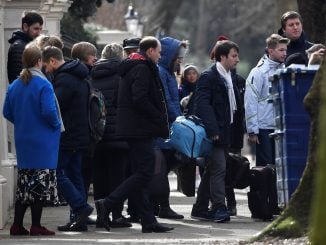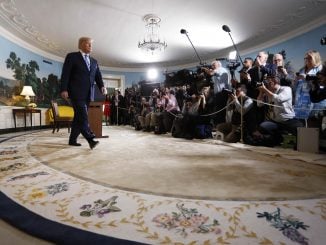LONDON — British Prime Minister Boris Johnson has called for an early general election and the opposition Labour Party has agreed, so Britain is likely facing a rare winter vote.
Johnson is pushing for an election in hopes of breaking the parliamentary stalemate that blocked his plan to take Britain out of the European Union this month. This week the EU granted Britain a three-month Brexit extension until Jan. 31.
Johnson — who has had to abandon his vow to lead Britain out of the EU on Oct. 31 “do or die” — accused his opponents of wanting to prolong the Brexit process “until the 12th of never.”
He told lawmakers in Parliament on Tuesday there was no choice but “to go to the country to break free from this impasse.”
“There is only one way to get Brexit done in the face of this unrelenting parliamentary obstructionism, this endless, willful, fingers crossed, ‘not me guv’ refusal to deliver on the mandate of the people — and that is to refresh this Parliament and give the people a choice,” Johnson said.
For weeks, opposition parties have defeated Johnson’s attempts to trigger an election. But now that Brexit has been delayed, Labour leader Jeremy Corbyn said his opposition party would vote in favor of an early election because the prospect that Britain could crash out of the EU without a divorce deal had been taken off the table.
WHY IS JOHNSON CALLING FOR A VOTE?
The next scheduled election is set for 2022, but Johnson’s Conservative Party has lost its working majority in Parliament and he has been unable to pass his Brexit plan. In addition, Parliament passed a law preventing Britain from leaving the European Union on Thursday, as Johnson had wanted. He is gambling that voters favor his Brexit approach and will reward him with a new, more flexible Parliament that sees things his way.
WILL IT WORK?
Polls show Johnson’s party is doing relatively well, but elections are remarkably unpredictable, and the Conservatives lost ground after confidently calling an early vote in 2017. It’s also entirely possible that the new Parliament’s makeup could be very much like the present Parliament, which could lead to still more deadlock, because there would not be majority support for any specific Brexit plan. There is no guarantee that an election will solve the Brexit riddle.
WHY DID THE OPPOSITION LABOUR PARTY AGREE AFTER RESISTING EARLIER CALLS FOR A VOTE?
Party leader Jeremy Corbyn said all along he would back a vote once a “no-deal” Brexit on Oct. 31 was taken off the table. That happened Monday when the EU offered an extension that Johnson accepted (as he was required to do by law). Corbyn had few other options, even though polls suggest his party would have to gain ground if it is to win a majority.
WHEN WAS THE LAST DECEMBER NATIONAL ELECTION? AND WHY ARE THEY SO RARE?
Britain last had a December election in 1923. There are lots of reasons why other times of the year are preferred. There’s the obvious conflict with the Christmas holidays, with many people busy with shopping and parties. Some of the polling places that would normally be used are already booked for festive events. Then there’s the weather: The days are short, so many people would have to go to the polls in the dark, and it’s often rainy or snowy in the northern parts of the country. Campaign events that would normally be held in town squares or city centers may be moved inside.
WHAT ARE SOME OF THE X-FACTORS?
It’s difficult to predict the impact the Brexit Party led by Nigel Farage will have. The party is less than a year old and fared well in European Parliament elections in May, winning 29 seats. It may challenge Johnson’s Conservatives for the support of pro-Brexit voters. Johnson has never faced a national election as party leader before, but he is an experienced campaigner. Corbyn did better than expected in 2017, costing then-Prime Minister Theresa May her majority in Parliament. The leader of the resurgent Liberal Democrats, Jo Swinson, is also facing her first national campaign as party chief.


